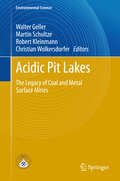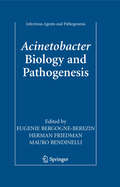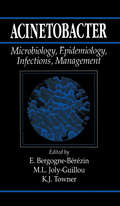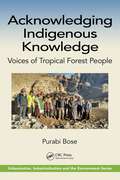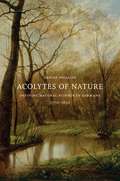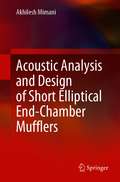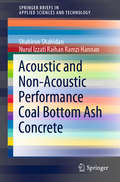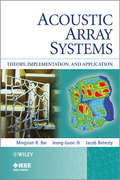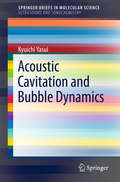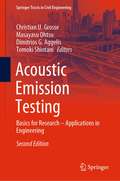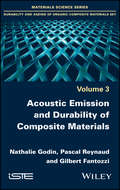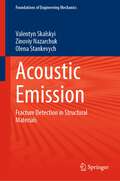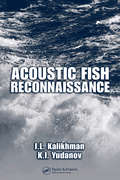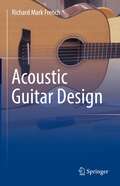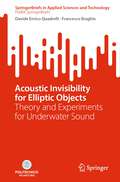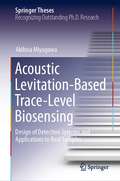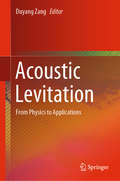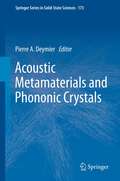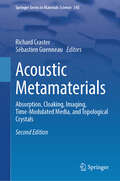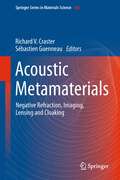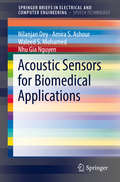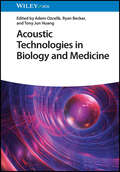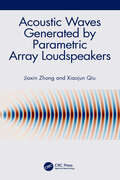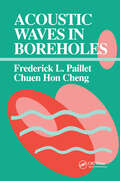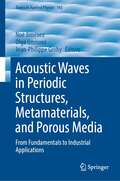- Table View
- List View
Acidic Pit Lakes: The Legacy of Coal and Metal Surface Mines (Environmental Science and Engineering)
by Bob Kleinmann Christian Wolkersdorfer Martin Schultze Walter GellerThis monograph provides an international perspective on pit lakes in post-mining landscapes, including the problem of geogenic acidification. Much has been learned during the last decade through research and practical experience on how to mitigate or remediate the environmental problems of acidic pit lakes. In the first part of the book, general scientific issues are presented in 21 contributions from the fields of geo-environmental science, water chemistry, lake physics, lake modeling, and on the peculiar biological features that occur in the extreme habitats of acidic pit lakes. Another chapter provides an overview of methods currently used to remediate acidic pit lakes and treat outflowing acidic water. The second part of the book is a collection of regional surveys of pit lake problems from three European countries and Australia, and case studies of various individual representative lakes. A final case study provides an innovative approach to assessing the economic value of new pit lakes and balancing the costs and benefits, a valuable tool for decision makers.
Acinetobacter: Biology and Pathogenesis (Infectious Agents and Pathogenesis)
by Eugénie Bergogne-Bérézin Mauro Bendinelli Herman FriedmanThere is currently increasing interest concerning the biology and disease caused by Acinetobacter species. Such interest, however, developed relatively slowly because of the necessity to clarify the confusing taxonomy of these organisms. Much work was needed to identify various species as members of this genus, to recognize their epidemiologic profile, their pathogenic role and their increasing importance as multi-antibiotic resistant organisms. In recent years improvement of genetic approaches, recognition of plasmids, integrons and chromosomal sources of resistance mechanisms aroused interest on the role of Acinetobacters in disease by many microbiologists and clinicians, especially internists and infectious disease specialists. In this regard, physicians are frequently confronted with extremely difficult therapeutic approaches for treatment and prevention of severe nosocomial infections due to multi antibiotic resistant Acinetobacter. Moreover, recent observations of community acquired infections have been reported, especially in patients with various risk factors such as immuno-deficiencies. Also, it is now becoming evident that Acinetobacter infections occur frequently in violent situations such as earthquake or war zones. The mechanisms of Acinetobacter virulence are becoming increasingly clear, providing new insights into their pathogenic role in community acquired infections. It is apparent the time is appropriate for detailed review of the increasing knowledge concerning important new information, both clinical and therapeutic, especially information concerning virulence, resistance mechanisms and typing of Acinetobacter spp. Many new findings are accumulating in almost an exponential manner since publication of previous books on this subject in 1991 and 1996.
Acinetobacter: Microbiology, Epidemiology, Infections, Management
by E. Bergogne-Berezin Marie-Laure Joly-Guillou Kevin J. TownerAcinetobacter details the clinical aspects of this bacterium responsible for many infections in hospitalized patients. This reference explains the importance of these organisms, both from the patient's viewpoint and the economic perspective, and provides clinicians with the knowledge they need to control these bacteria.
Acknowledging Indigenous Knowledge: Voices of Tropical Forest People (Urbanization, Industrialization, and the Environment)
by Purabi BoseThis book explores how the landscapes in indigenous territories are rapidly changing due to increased global industrial demand. This deforestation and urbanization have isolated the indigenous people from practicing ‘traditional ways of life.’ Portrayed in this book is the indigenous people’s perspective of their indigenous knowledge (IK) about the environment and why losing IK is a threat to humans, wildlife, and nature. Insight is shared into why acknowledging IK as a science can help solve climate change, food and nutrition insecurity, and increasing new types of pandemics through evidence‑based stories from indigenous people. Features:• Bridges the fractured space between science and nature.• Documents the perspectives of indigenous peoples about their ancestral knowledge.• Provides ethnographic qualitative comparative case studies of forest‑dwelling indigenous peoples over a 19‑year period.• Covers largely remote indigenous territories of ten tropical countries in the Global South.• Provides evidence‑based stories examining indigenous knowledge’s role in the tropics in preserving diverse landscapes and providing nature‑based solutions.
Acolytes of Nature: Defining Natural Science in Germany, 1770-1850
by Denise PhillipsAlthough many of the practical and intellectual traditions that make up modern science date back centuries, the category of “science” itself is a relative novelty. In the early eighteenth century, the modern German word that would later mean “science,” naturwissenschaft, was not even included in dictionaries. By 1850, however, the term was in use everywhere. Acolytes of Nature follows the emergence of this important new category within German-speaking Europe, tracing its rise from an insignificant eighteenth-century neologism to a defining rallying cry of modern German culture. Today’s notion of a unified natural science has been deemed an invention of the mid-nineteenth century. Yet what Denise Phillips reveals here is that the idea of naturwissenschaft acquired a prominent place in German public life several decades earlier. Phillips uncovers the evolving outlines of the category of natural science and examines why Germans of varied social station and intellectual commitments came to find this label useful. An expanding education system, an increasingly vibrant consumer culture and urban social life, the early stages of industrialization, and the emergence of a liberal political movement all fundamentally altered the world in which educated Germans lived, and also reshaped the way they classified knowledge.
Acoustic Analysis and Design of Short Elliptical End-Chamber Mufflers
by Akhilesh MimaniThis book presents a three-dimensional analysis of acoustic wave propagation in an elliptical waveguide, and applies the equations and concepts to design axially short elliptical end-chamber muffler configurations which are an important component of a complex multi-pass muffler used in a modern-day automotive exhaust system. A general solution of the Helmholtz equation in elliptical cylindrical co-ordinates is presented in terms of the Mathieu and modified Mathieu modal functions. This is followed by the tabulation and analysis, for the first time, of the non-dimensional resonance frequencies of the transverse modes of a rigid-wall elliptical waveguide for a complete range of aspect ratio. The modal shape patterns of the first few circumferential, radial and cross-modes are examined with particular attention to the pressure nodal ellipses and hyperbolae. An analytical formulation is then outlined for characterizing a single-inlet and single-outlet elliptical muffler with the inlet located on the end face and the outlet located either on the end face or side-surface. The ensuing chapter is devoted toward analyzing the Transmission Loss (TL) performance of different short end-chamber mufflers, namely (a) the straight-flow configuration having ports located on the opposite face, (b) the flow-reversal configuration with ports located on the same end face and (c) configuration with inlet port on the end face and outlet on the side surface. Design guidelines are formulated in terms of the optimal location of inlet and outlet ports which suppresses the deteriorating influence of certain higher-order modes, thereby delivering a broadband TL performance. Directions for future work are discussed toward the end. In summary, this book is a one-stop solution for a practicing automotive engineer designing mufflers, for an applied mathematician studying wave propagation in elliptical geometries, and also as a niche area within noise control engineering.
Acoustic And Non-Acoustic Performance Coal Bottom Ash Concrete (SpringerBriefs in Applied Sciences and Technology)
by Shahiron Shahidan Nurul Izzati Raihan Ramzi HannanThis book highlights the acoustic performance of concrete made with Coal Bottom Ash (CBA) that has contributed to environmental issues. The usage of CBA in concrete can be recommended as good concrete due to its absorption properties. This book focuses on the principles and techniques employed in acoustic design. The book first elaborates on the perception of noise and properties of noise, followed by physical data, units and measurements. Finally, it takes a look at acoustic analysis which includes acoustic performance effects using different volumes of CBA, density and porosity of concrete.
Acoustic Array Systems: Theory, Implementation, and Application (Wiley - IEEE)
by Jacob Benesty Mingsian R. Bai Jeong-Guon IhPresents a unified framework of far-field and near-field array techniques for noise source identification and sound field visualization, from theory to application. Acoustic Array Systems: Theory, Implementation, and Application provides an overview of microphone array technology with applications in noise source identification and sound field visualization. In the comprehensive treatment of microphone arrays, the topics covered include an introduction to the theory, far-field and near-field array signal processing algorithms, practical implementations, and common applications: vehicles, computing and communications equipment, compressors, fans, and household appliances, and hands-free speech. The author concludes with other emerging techniques and innovative algorithms. Encompasses theoretical background, implementation considerations and application know-how Shows how to tackle broader problems in signal processing, control, and transudcers Covers both farfield and nearfield techniques in a balanced way Introduces innovative algorithms including equivalent source imaging (NESI) and high-resolution nearfield arrays Selected code examples available for download for readers to practice on their own Presentation slides available for instructor use A valuable resource for Postgraduates and researchers in acoustics, noise control engineering, audio engineering, and signal processing.
Acoustic Cavitation and Bubble Dynamics (SpringerBriefs in Molecular Science)
by Kyuichi YasuiThis brief explains in detail fundamental concepts in acoustic cavitation and bubble dynamics, and describes derivations of the fundamental equations of bubble dynamics in order to support those readers just beginning research in this field. Further, it provides an in-depth understanding of the physical basis of the phenomena. With regard to sonochemistry, the brief presents the results of numerical simulations of chemical reactions inside a bubble under ultrasound, especially for a single-bubble system and including unsolved problems. Written so as to be accessible both with and without prior knowledge of fundamental fluid dynamics, the brief offers a valuable resource for students and researchers alike, especially those who are unfamiliar with this field. A grasp of fundamental undergraduate mathematics such as partial derivative and fundamental integration is advantageous; however, even without any background in mathematics, readers can skip the e quations and still understand the fundamental physics of the phenomena using the book's wealth of illustrations and figures. As such, it is also suitable as an introduction to the field.
Acoustic Emission Testing: Basics for Research – Applications in Engineering (Springer Tracts in Civil Engineering)
by Masayasu Ohtsu Christian U. Grosse Dimitrios G. Aggelis Tomoki ShiotaniThis book provides an introduction to Acoustic Emission Testing and its applications to different materials like concrete, steel, ceramics, geotechnical materials, polymers, biological structures and wood. Acoustic Emission Techniques (AET) techniques have been studied in engineering for a long time. The techniques are applied more and more to practical investigations and are more and more standardized in codes. This is because the degradation of structures due to ageing urgently demand for maintenance and rehabilitation of structures in service. It results in the need for the development of advanced and efficient inspection techniques. In mechanical engineering and concerning the monitoring of machines and mechanical components, AE is a widely accepted observing deterioration in the frame of structural health monitoring. The advantages of AE like sensitivity, damage localization potential, non-intrusive nature as well as developments in signal analysis and data transmission allow applications that could not be considered decades ago.As such, AE techniques draw great attention to diagnostic applications and in material testing. This book covers all levels from the description of AE basics for AE beginners (level of a student) to sophisticated AE algorithms and applications to real large-scale structures as well as the observation of the cracking process in laboratory specimen to study fracture processes. This book has proved its worth over the past twelve years. Now in its second edition, it will be a resource that sets the standard and equips readers for the future. All chapters from the 1st edition have been updated and rewritten and eight extra chapters (e.g also regarding AE tomography, AE in plate-like structures and AE for investigations of hardening of fresh concrete) have been added.
Acoustic Emission and Durability of Composite Materials
by Nathalie Godin Pascal Reynaud Gilbert FantozziIn this book, two kinds of analysis based on acoustic emission recorded during mechanical tests are investigated. In the first, individual, analysis, acoustic signature of each damage mechanism is characterized. So with a clustering method, AE signals that have similar shapes or similar features can be group together into a cluster. Afterwards, each cluster can be linked with a main damage. The second analysis is based on a global AE analysis, on the investigation of liberated energy, with a view to identify a critical point. So beyond this characteristic point, the criticality can be modeled with a power-law in order to evaluate time to failure.
Acoustic Emission: Fracture Detection in Structural Materials (Foundations of Engineering Mechanics)
by Zinoviy Nazarchuk Valentyn Skalskyi Olena StankevychThe book presents topical theoretical and experimental studies for developing advanced methods of detecting materials fracture and assessing their structural state using acoustic emission. It introduces new mathematical models characterizing the displacement fields arising from crack-like defects and establishes a new criterion for classifying different types of materials fracture based on specific parameters obtained from wavelet transforms of acoustic emission signals. The book applies this approach to experimental studies in three types of materials—fiber-reinforced composites, dental materials, and hydrogen-embrittled steels.
Acoustic Fish Reconnaissance
by I.L. Kalikhman K. I. YudanovUntil now, there has not been any work that systematically presents the subject of acoustic fish reconnaissance, details all major aspects of applying acoustic equipment in commercial fish reconnaissance, and offers sufficient analysis of the effectiveness of fish-finding techniques. Acoustic Fish Reconnaissance responds to this need by providing t
Acoustic Guitar Design
by Richard Mark FrenchThis book is for experienced luthiers and guitar designers in the industry, novice builders wishing to improve their designs, and guitar owners interested in knowing more about their instruments. It includes the most important technical information gathered from many sources, including the academic literature and the author’s own work, presented here in a clear, actionable form with a minimum of mathematics. The book begins with a historical survey on how important features of the acoustic guitar evolved over centuries. The review leads up to a chapter focusing on three iconic instruments that represent the most important types of acoustic guitars: classical, steel string flat top and archtop. As the guitar market is so strongly conditioned by familiar, traditional instruments, a successful builder must have a thorough working understanding of the most important designs to underpin their own work. Through this volume, Professor French lays out the entire design process and collects detailed information in one convenient source. Luthiers quite often compile notebooks of measurements, part numbers, specific design features and other details they routinely need. This book organizes much of that information, with tables of dimensions, material properties, and other details in one essential final chapter. The book also features concise side bar contributions by top guitar designers and builders including Tim Shaw, Chief Engineer at Fender Music; Bob Taylor, Co-Founder of Taylor Guitars; and Andy Powers, Master Guitar Designer and Partner.
Acoustic Invisibility for Elliptic Objects: Theory and Experiments for Underwater Sound (SpringerBriefs in Applied Sciences and Technology)
by Francesco Braghin Davide Enrico QuadrelliThe book investigates acoustic cloaking for elliptical targets, starting from the development of a systematic approach to deal with such non-axisymmetrical shapes by adopting transformation acoustics in elliptic coordinates, and concluding with numerical and experimental validation of a microstructured cloak in the underwater environment. The book thus comprises all the steps from theory to practice that led to the first experimental validation of acoustic invisibility for non-cylindrical objects, whose results are presented in the last chapter. Indeed, despite Transformation Theory is now an established tool to design material distributions capable to unlock the design of invisibility devices, it is not trivial to apply it for shapes different than the sphere and the cylinder, which are thus the ones mainly addressed in the literature. This book paves the way for exploration of other shapes, demonstrating the effectiveness of a pentamode cloak in reducing the acoustic visibility of an elliptical target, and discussing design choices that can make the implementation of the required microstructure less cumbersome despite the lack of axial symmetry of the problem, from both the numerical and manufacturing point of views.
Acoustic Levitation-Based Trace-Level Biosensing: Design of Detection Systems and Applications to Real Samples (Springer Theses)
by Akihisa MiyagawaThis book shows the availability and potential of the coupled acoustic-gravitational (CAG) field for trace-level biosensing. The proposed detection scheme also allows the evaluation of the kinetics and thermodynamics of the reaction occurring on a single microparticle (MP). This method has wide applicability in important fields, involving not only chemistry but also life, environmental, and medical sciences. The author proposes novel trace-level biosensing based on measurements of the levitation coordinate shift of an MP in the CAG field. The levitation coordinate of the MP in the CAG field is determined by its density and compressibility. The levitation coordinate shift is induced by the binding of gold nanoparticles (AuNPs) to the MP through interparticle reactions. Therefore, the quantity of molecules involved in the reaction can be determined from the levitation coordinate shift. The author demonstrates the zmol level detection for biotin, DNA/RNA, and organic molecules. In addition, the kinetics and thermodynamics are evaluated for various reactions occurring between the MP and AuNP, such as the avidin-biotin reaction, direct hybridization, sandwich hybridization, and aptamer-target complexation.This book provides a new concept based on the CAG field, in which the extent of a reaction is converted into the levitation coordinate shift, that is, “length.” The proposed method has many advantages over other methods, e.g., high biocompatibility, high applicability, and short analysis time. In addition, because the apparatus used in this study is inexpensive and easy to miniaturize, this method is useful in important practical fields, such as forensic and environmental science and diagnosis. Thus, this book inspires many researchers to apply the present method to their own fields of interest.
Acoustic Levitation: From Physics to Applications
by Duyang ZangThis book systematically introduces readers to the fundamental physics and a broad range of applications of acoustic levitation, one of the most promising techniques for the container-free handling of small solid particles and liquid droplets. As it does away with the need for solid walls and can easily be incorporated into analysis instruments, acoustic levitation has attracted considerable research interest in many fields, from fluid physics to material science. The book offers a comprehensive overview of acoustic levitation, including the history of acoustic radiation force; the design and development of acoustic levitators; the technology’s applications, ranging from drop dynamics studies to bio/chemical analysis; and the insightful perspectives that the technique provides. It also discusses the latest advances in the field, from experiments to numerical simulations. As such, the book provides readers with a clearer understanding of acoustic levitation, while also stimulating new research areas for scientists and engineers in physics, chemistry, biology, medicine and other related fields.
Acoustic Metamaterials and Phononic Crystals (Springer Series in Solid-State Sciences #173)
by Pierre A. DeymierThis comprehensive book presents all aspects of acoustic metamaterials and phononic crystals. The emphasis is on acoustic wave propagation phenomena at interfaces such as refraction, especially unusual refractive properties and negative refraction. A thorough discussion of the mechanisms leading to such refractive phenomena includes local resonances in metamaterials and scattering in phononic crystals.
Acoustic Metamaterials: Absorption, Cloaking, Imaging, Time-Modulated Media, and Topological Crystals (Springer Series in Materials Science #345)
by Sébastien Guenneau Richard CrasterThe revised edition of this book offers an expanded review of acoustic metamaterials; novel materials which can manipulate sound waves, surface Rayleigh waves and water waves, in surprising ways, which include collimation, focusing, negative refraction, passive and active cloaking, sonic screening and extraordinary transmission. It covers both experimental and theoretical aspects of acoustic and elastic waves propagating in structured composites, with a focus on effective properties associated with negative refraction, lensing and cloaking. Updated chapters cover filtering effects, extraordinary transmission, sub-wavelength imaging via tomography or time-reversal techniques, cloaking via transformation acoustics, elastodynamics, and acoustic scattering cancellation. For this revised edition, six new chapters have been introduced to reflect recent developments in experimental acoustics and metasurfaces including acoustic impedance gratings and mirror symmetric metamaterials, phononic subsurfaces, time-modulated and topological crystals. The latter two are illustrated by simple Python program examples. The broad scope gives the reader an overview of the state of the art in acoustic metamaterials research and an indication of future directions and applications. It will serve as a solid introduction to the field for advanced students and researchers in physics, applied mathematics and mechanical engineering, and a valuable reference for those working in metamaterials and related areas.
Acoustic Metamaterials: Negative Refraction, Imaging, Lensing and Cloaking (Springer Series in Materials Science #166)
by Richard V. Craster Sébastien GuenneauAbout the book: This book is the first comprehensive review on acoustic metamaterials; novel materials which can manipulate sound waves in surprising ways, which include collimation, focusing, cloaking, sonic screening and extraordinary transmission. It covers both experimental and theoretical aspects of acoustic and elastic waves propagating in structured composites, with a focus on effective properties associated with negative refraction, lensing and cloaking. Most related books in the field address electromagnetic metamaterials and focus on numerical methods, and little (or no) experimental section. Each chapter will be authored by an acknowledged expert, amongst the topics covered will be experimental results on non-destructive imaging, cloaking by surface water waves, flexural waves in thin plates. Applications in medical ultrasound imaging and modeling of metamaterials will be emphasized too. The book can serve as a reference for researchers who wish to build a solid foundation of wave propagation in this class of novel materials.
Acoustic Sensors for Biomedical Applications (SpringerBriefs in Speech Technology)
by Nilanjan Dey Amira S. Ashour Nhu Gia Nguyen Waleed S. MohamedIn this book, application-related studies for acoustic biomedical sensors are covered in depth. The book features an array of different biomedical signals, including acoustic biomedical signals as well as the thermal biomedical signals, magnetic biomedical signals, and optical biomedical signals to support healthcare. It employs signal processing approaches, such as filtering, Fourier transform, spectral estimation, and wavelet transform. The book presents applications of acoustic biomedical sensors and bio-signal processing for prediction, detection, and monitoring of some diseases from the phonocardiogram (PCG) signal analysis. Several challenges and future perspectives related to the acoustic sensors applications are highlighted. This book supports the engineers, researchers, designers, and physicians in several interdisciplinary domains that support healthcare.
Acoustic Technologies in Biology and Medicine
by Adem Ozcelik Ryan Becker Tony Jun HuangAcoustic Technologies in Biology and Medicine Complete, balanced resource encompassing all required technical, theoretical, and applied multidisciplinary knowledge related to acoustics Taking a multidisciplinary approach involving fluid mechanics, physics, chemistry, electronics, and the life sciences to provide a unified and competent overview of the field, Acoustic Technologies in Biology and Medicine covers the fundamental principles of acoustic wave generation and propagation, different acoustic systems and technologies with the interplay of physical forces, theoretical foundations, and the state-of-the-art biomedical applications of acoustics. State-of-the-art applications of acoustics in biology and medicine are presented, including single cell and organism manipulation, acoustic biosensing, cancer cell isolation (liquid biopsy), cell/tissue stimulation and ablation, micro-robot actuation, acoustic imaging, and drug delivery. Contributed to and edited by highly qualified professionals with significant experience in the field, Acoustic Technologies in Biology and Medicine covers sample topics such as: Materials for acoustic wave generation and modulation, ultrasound imaging, and photoacoustic imaging and sensing for biomedical applications Therapeutic ultrasound, application of ultrasound responsive reagents for drug delivery systems, and acoustic levitation and acoustic holograms Application of ultrasonic waves in bioparticle manipulation and separation, acoustic biosensors, and acoustic micro and nanorobots in medicine Different technologies of acoustic systems, including bulk and surface acoustic wave-based platforms, acoustic imaging, acoustic sensors, and acoustic levitators A cornerstone reference bridging the gap between rapidly advancing acoustic technologies with state-of-the-art applications in biology and medicine, Acoustic Technologies in Biology and Medicine is an essential resource on the subject for biophysicists, materials scientists, biotechnologists, bioengineers, sensor developers, electronics engineers, and all professionals in the greater biotechnological industry.
Acoustic Waves Generated by Parametric Array Loudspeakers
by Xiaojun Qiu Jiaxin ZhongParametric array loudspeakers (PALs) are capable of generating highly directional audio beams from nonlinear interactions of intense airborne ultrasound waves. This unique capability holds great potential in audio engineering. This book systematically introduces the physical principles of acoustics waves generated by PALs, along with the commonly used and the state-of-the-art numerical models, such as the Westervelt model, the convolution directivity model, the Gaussian beam expansion method, and the spherical wave expansion method.The properties of sound fields generated by PALs are analyzed. Also analyzed are various phenomena including the reflection of acoustics waves generated by PALs from a surface, transmission through a thin partition, scattering by a rigid sphere, and propagation in rooms. Furthermore, the steering and focusing of acoustics waves generated by PALs and potential applications of PALs in active sound control are investigated. Finally, the implementation issues of hardware, signal processing techniques, measurement, and safety are discussed.The book is tailored to meet the needs of researchers in this field, as well as audio practitioners and acoustics engineers.
Acoustic Waves in Boreholes
by Frederick L. Paillet Chuen Hon ChengIntroducing the first, self-contained reference on acoustic waveform loggingAcoustic measurements in boreholes were first made as a specialized logging technique in geological exploration, but recent advances have greatly expanded the potential applications of this technique. Acoustic Waves in Boreholes provides a thorough review of the theory and interpretation techniques needed to realize these applications, emphasizing the role of guided modes and critically refracted waves in determining the characteristics of recorded waveforms. Topics covered in this comprehensive volume include the seismic properties of rocks; propagation of axisymmetric waves along fluid-filled boreholes in isotropic rocks; and symmetric and nonsymmetric sources in isotropic, transversely isotropic, and porous, permeable formations in open and cased boreholes. Each chapter includes the theory of synthetic microseismogram computation, interpretation and data inversion techniques illustrated using computed seismograms, and case histories using experimental data. Appendices providing the mathematical formulation needed to compute microseismograms, with a single consistent notation used throughout, are also included in appropriate chapters.The wide range of geomechanical properties covered in this book will interest exploration geophysicists, reservoir engineers, civil engineers, geologists, and soil scientists.
Acoustic Waves in Periodic Structures, Metamaterials, and Porous Media: From Fundamentals to Industrial Applications (Topics in Applied Physics #143)
by Noé Jiménez Olga Umnova Jean-Philippe GrobyThis book delivers a comprehensive and up-to-date treatment of practical applications of metamaterials, structured media, and conventional porous materials. With increasing levels of urbanization, a growing demand for motorized transport, and inefficient urban planning, environmental noise exposure is rapidly becoming a pressing societal and health concern. Phononic and sonic crystals, acoustic metamaterials, and metasurfaces can revolutionize noise and vibration control and, in many cases, replace traditional porous materials for these applications.In this collection of contributed chapters, a group of international researchers reviews the essentials of acoustic wave propagation in metamaterials and porous absorbers with viscothermal losses, as well as the most recent advances in the design of acoustic metamaterial absorbers. The book features a detailed theoretical introduction describing commonly used modelling techniques such as plane wave expansion, multiple scattering theory, and the transfer matrix method. The following chapters give a detailed consideration of acoustic wave propagation in viscothermal fluids and porous media, and the extension of this theory to non-local models for fluid saturated metamaterials, along with a description of the relevant numerical methods. Finally, the book reviews a range of practical industrial applications, making it especially attractive as a white book targeted at the building, automotive, and aeronautic industries.
